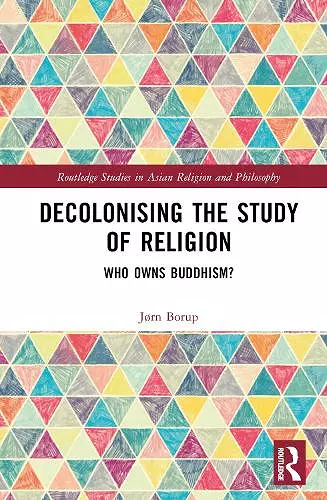Decolonising the Study of Religion
Who Owns Buddhism?
Format:Hardback
Publisher:Taylor & Francis Ltd
Published:28th Dec '23
Currently unavailable, and unfortunately no date known when it will be back
This hardback is available in another edition too:
- Paperback£38.99(9781032593449)

Decolonising the Study of Religion analyses historical and contemporary discussions in the study of religion and Buddhism and critically investigates representations, possibilities, and challenges of a decolonial approach, addressing the important question: who owns Buddhism?
The monograph offers a case-based perspective with which to examine the general study of religion, where new challenges require reflection and prospects for new directions. It focuses on Buddhism, one religion which has been studied in the West for centuries. Building on postcolonial theories and supplemented with a critical analysis of identity and postsecular engagement, the book offers new possibilities and challenges to the study of religion. It critically investigates decolonisation in the study of religion, subscribing to a third way between ‘objectivist’ and ‘subjectivist’ positions.
Analysing the postcolonial and decolonial critique of the study of religion, with a particular focus on Buddhist studies in the West and in Japan, this book will be of interest to researchers in the field of Religious Studies, Buddhism, Japanese religions, anthropology, Asian Studies and those interested in religion and decolonisation.
“The monograph makes an extremely important contribution to a multi-layered debate that has been intensely preoccupying not only religious and Buddhist studies for several years. The timing of the publication is excellent, as the book makes a decisive contribution to objectifying a debate that often drifts into polemics and polarisation. I cannot but strongly recommend this book for publication.”
– Christoph Kleine, University of Leipzig, Germany
“Borup’s book addresses important and timely issues for the study of Buddhism and Religious Studies as a whole.”
– Stephen C. Berkwitz, Missouri State University, USA
"Decolonising the Study of Religion helpfully explores the manifestations, goals, and challenges of the decolonisation movement, both generally in Religious Studies and specifically within Buddhist Studies. In following primarily a descriptive rather than prescriptive approach, the author … offers a fairly balanced critique of what the author calls ‘colonialism’, ‘soft decolonisation’, and ‘hard decolonisation’. The difference between the last two orientations is that soft decolonisation wants to reform various systems, both academic and non-academic, whereas hard decolonisation wishes to tear down these systems and start anew (29). In the end Borup favours soft decolonisation as a middle way between extremes, since what is needed most are “critical studies of critical studies” (178) […] the book offers a cogent, capable, and informative exploration of the dynamics of decolonisation both within and without scholarly worlds."
– Daniel Capper, Metropolitan State University of Denver, USA, Journal of Contemporary Religion, 09 Aug 2024.
"This book delves into a timely and somewhat heated topic that will undoubtedly garner increasing attention in the years ahead; the decolonial challenges of studying Buddhism and religion, including their connections to identity politics, postcolonialism, and "critical studies." The book carefully examines and analyzes this prominent theme to untangle the complex field, using specific cases from Western and Japanese traditions in historical and contemporary contexts."
– Mitra Härkönen, University of Helsinki, Finland. Nordic Journal of Religion and Society. Vol.37, Iss.2
"This is an important book that is relevant not only to specialists in Buddhist Studies but to all those who take Religious Studies seriously in the light of postcolonial and decolonial critique. Borup uses a broad brush, except in his treatment of Japan meaning that nuance is missed in some places. However, his examination of the decolonial critique of Religious Studies and his critical discussion of this critque is balanced and authoritative, recognising not only the importance of decolonising the study of religion but also the right scholars of religion to retain rigorous analysis in their toolkits. I recommend this book."
– Elizabeth J. Harris, University of Birmingham, UK, BASR Bulletin 145: November 2024
“The book maintains a balanced perspective, advocating for critical decolonial insight in religious studies yet remaining “suspicious that the hermeneutics of suspicion is not sufficiently suspicious of itself. […] Overall, this book is an excellent resource for anyone interested in the shifting discourse on identity, (post)colonialism, critical studies, and the academic study of religion.”
– Davide Marino, Religious Studies Review. Volume 50, Issue 4 p. 819.
"[This book] is an important contribution to ongoing debates about knowledge production, cultural representation, and the legacy of colonialism in academia. It offers a thoughtful and balanced examination of decolonial critiques while also highlighting their limitations. This book is essential reading for scholars of religion, particularly those working in Buddhist studies, especially Kindai Bukkyo Gaku 近代仏教学 as well as anyone interested in the broader implications of the decolonial turn in academia. Borup’s work challenges us to think critically about our own positionality and the frameworks we use to understand and study religion, without losing sight of the value of rigorous, scholarly inquiry."
-- DAKE Nobuya, Journal of World Buddhist Cultures vol 8. 2025.3.
"I can only highly recommend this book to all, I emphasize: all scholars of religion, especially to students. I assume that it will become part of the required reading canon at our institute. It arrives at just the right time and, in its accessible way, offers a valuable contribution to overcoming the polarization that is also becoming noticeable in the cultural sciences… [Borup] remains always factual and never becomes polemical, and he succeeds in an impressive way in portraying a nuanced picture of the theory debate, its genesis, its differentiation, and the discursive interconnections."
-- Christoph Kleine Zeitschrift für Religionswissenschaft (2025)
ISBN: 9781032593395
Dimensions: unknown
Weight: 453g
240 pages